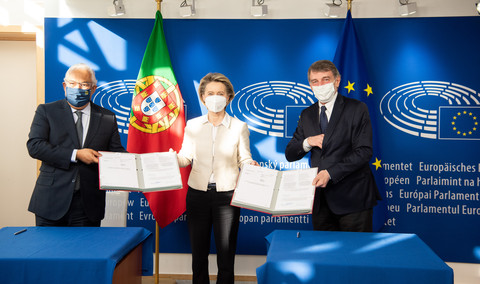[ad_1]

After months of haggling over which EU politician should be the face of the much-delayed Conference on the Future of Europe, on Wednesday (10 March) the heads of the three EU institutions will finally give their blessing to the public citizens’ meetings.
EU Commission president Ursula von der Leyen, European Parliament president David Sassoli, and Portuguese prime minister António Costa – whose country holds the EU’s rotating presidency – will sign a joint declaration on the conference.
The actual debate should start soon, as the EU must draw the conclusions by spring 2022 when France will hold the EU presidency. French president Emmanuel Macron was behind the idea of setting up a conference to better involve EU citizens.
The aim will be to hear from EU citizens on what direction the bloc should go in the next decades.
How to do that in a pandemic? The EU will organise debates and panels across the bloc and create a “multilingual digital platform”.
In the end, the conference will be chaired by a joint presidency – made up of the three EU institutions chiefs.
A nine-member executive board will be in charge of making the conference work, they will be backed up by a common secretariat. A conference plenary will meet every six months to make sure the conference is organised as citizens want it.
Don’t forget the flowers
On Monday (8 March), EU chiefs will honour International Women’s Day: Sassoli and Von der Leyen will address MEPs.
New Zealand prime minister Jacinda Ardern will also have a pre-recorded video message to European lawmakers.
Health funds
MEPs will debate and vote on Thursday (11 March) on the €5.1bn EU4Health programme for 2021-2027, aiming to make EU health systems more resilient, address cross-border issues, and make medicines and medical devices more available and affordable.
On Tuesday (9 March), lawmakers are also set to adopt the new InvestEU programme, which is expected to mobilise close to €400bn in public and private investments and provide help for small businesses.
On Thursday, MEPs will hold a debate with the commission on the Covid-19 recovery fund, which has yet to be unleashed as member states are still in the process of adopting legislation that allows the commission to raise money on the markets for the fund.
Carbon-border levy
MEPs will debate and on Wednesday vote on how to prevent EU production from being moved to non-EU countries that have less strict greenhouse gas emissions rules.
A carbon levy could be placed on imports of certain goods from outside the EU if they come from countries that have lower climate goals. The commission is expected to present a proposal on it in the spring of 2021.
MEPs are also on Wednesday voting for binding EU rules on holding companies accountable and liable when they harm, or contribute to harming, human rights, the environment, and good governance.
The parliament is finalising its position on due diligence requirements for human rights and the environmental protection, and the commission is expected to propose legislation in the spring.
Illiberal attention
On Wednesday afternoon, MEPs will debate the attempts by Polish, Hungarian, and Slovenian authorities to silence independent media with representatives of the Portuguese EU presidency and the commission.
One of Hungary’s only remaining independent radio stations has recently had to close down, while the Warsaw government has been trying to strip Polish free media of their revenues.
Media and journalists have also been under pressure in Slovenia, whose prime minister Janez Jansa has also verbally attacked journalists.
Migration talk
On Thursday (11 March) EU justice ministers will discuss data retention in fighting crime, after judgments from the European Court of Justice annulled the EU data-retention directive and set out the criteria for lawful retention of data.
The next day home affairs ministers will discuss the latest on efforts reforming the EU asylum policy, and hold a debate on the external aspects of migration.
[ad_2]
Source link